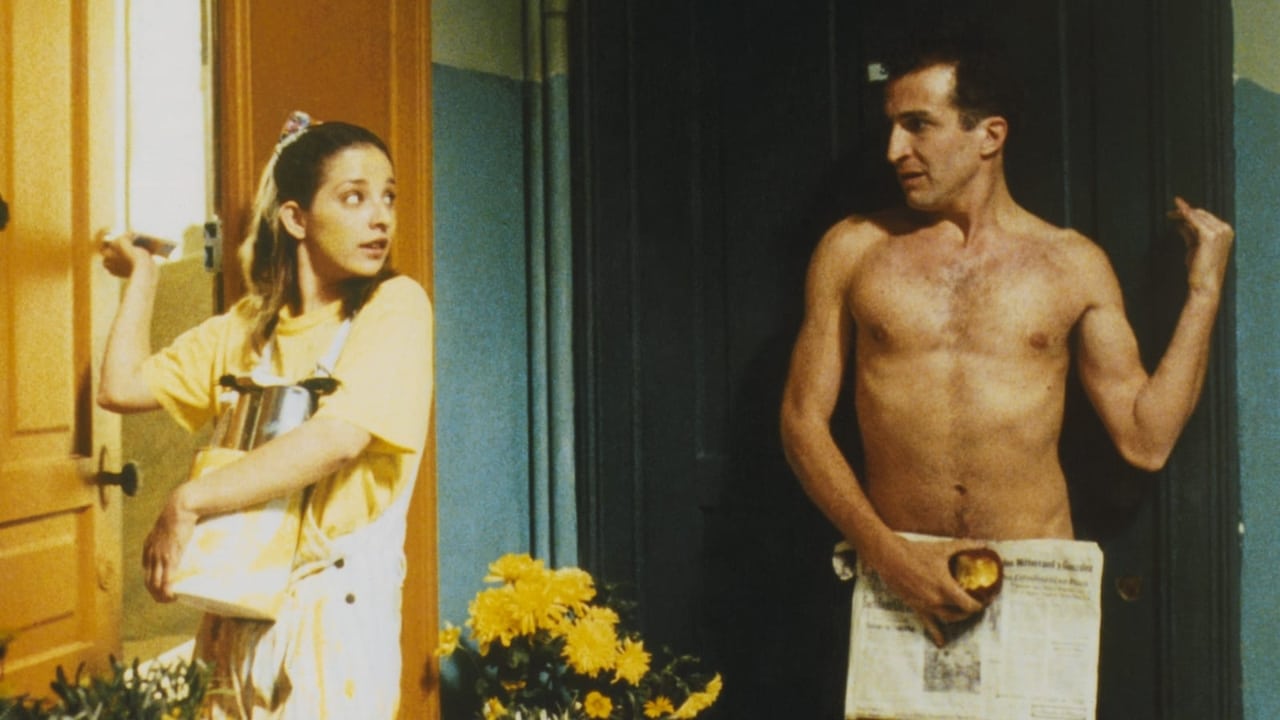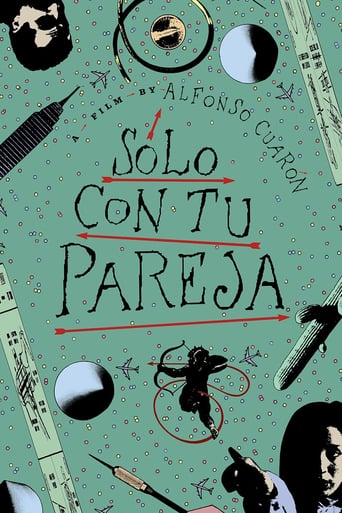



The greatest movie ever made..!
I enjoyed watching this film and would recommend other to give it a try , (as I am) but this movie, although enjoyable to watch due to the better than average acting fails to add anything new to its storyline that is all too familiar to these types of movies.
View MoreThe story, direction, characters, and writing/dialogue is akin to taking a tranquilizer shot to the neck, but everything else was so well done.
View MoreThrough painfully honest and emotional moments, the movie becomes irresistibly relatable
View MoreA slow, unsettlingly voyeuristic opening shot isn't the only thing that this film shares with it's younger brother Y Tu Mama Tambien. Both films use sexuality to explore the psyche of the protagonists, and tread the line between sex comedy and revelatory drama.Do not walk into this film anticipating some sort of deep thinking, however. Tenoch and Julio were completely broken down individuals, we saw what made them tick, etc...That multi-layering isn't existent within Tomas. He's a womanizer intent on attaining the most beautiful woman he's seen, nothing more. It's a much more straight forward goal and development, seemingly lacking the dimensions that Cuaron's future characters are comprised of.Tomas Tomas is an enthusiastic playboy adamant about not using condoms. When a scorned fling is put in a situation perfect for payback, she falsely marks his AIDS test positive, setting him off on a darkly comic quest to kill himself, but not before the love of his life finds out her husband is cheating on her and decides to end her own life as well. Tomas takes this opportunity to take her with him into death, as the one woman in his life, as far as we know, that he has a shred of respect for. This is revealed as he makes a list of the women he's slept with, laughing as he remembers their nick names, not necessarily even their real ones.Visually, this film marks a point before Cuaron adopted his now staple handicam cinematography. The shots are graceful and smooth, the editing the same. It was gorgeous, with more than one shot inserted solely for the composition (off the top of my head, the vial of Tomas' blood filling up in front of a black background, though the room was white) At more than one time I felt like pausing the film just to take in the images.While it marks a step toward what he will become, Solo Con Tu Pareja is a much more accessible and enjoyable film than the challenging ones that Cuaron eventually becomes known for. As a ribald comedy it succeeds, and it may be due to it's not trying to be. I'm not saying it's trying to be popcorn, but it also doesn't strive to change lives.
View MoreSolo Con Tu Pareja is a buried treasure. It's a bombastic screwball comedy by Alfonso Cuaron, who has since masterfully crafted Y Tu Mama Tambien and Children of Men with stunning individuality and creativity, both of which are within the consistent, crisply paced spirit of slapstick and farce that flourishes throughout this enormously entertaining movie about Tomás Tomás, a yuppie playboy, and a young publicist. Silvia Silva, the frustrated dupe of one of his sexual misadventures, tries to get back at him by typing "positive" on his AIDS test. Tomás, wanting to end his life, meets Clarissa, a flight attendant, who is also trying to end her own after finding out that her boyfriend is having an affair.It seems tasteless to make humor out of AIDS, but if it's funny, what's the problem? There isn't one then, is there? And one can't dispute that it's admirable for a film, not to mention a comedy, to break the myth that AIDS is a seclusively homosexual disease, a myth built by masculine ego, which this film parodies by its womanizing protagonist, played by an admittedly less than charming actor though it is a role that would not be far from ideal for Cary Grant.Really, what makes the film so funny is how insensitive everyone is. So many characters laugh at someone's tragic misfortune, are cavalier with life-or-death situations, are indifferent towards farcical situations which tie themselves in knots and Clarissa, the flight attendant, winds up quite accidentally with Tomas's stool rather than the lunch she has packed. Cuaron, along with his brother Carlos with whom he collaborated on the zany screenplay, loosens us up with affronting insensitivity splashed all over his broad comedy.Aside from some explosively hilarious moments, a lot of one's enjoyment derives from the time and place in which this obscure gem was made. It has the feel of a high-production- value 1990s movie and conceives an expressionistic treatment of Mexico City as a personality, as a character in this film. Everything in this movie is alive, so how can one be offended by the film's seeming tactlessness? The filmmakers clearly have enormous strength of mind. They merely show us that life is life and fate is fate.
View MoreHA! The first film by Alfonso Cuaron (Y Tu Mama Tambien, Children Of Men, HP: Prisoner Of Azkaban), is a multi-layered satire of Mexican culture, and a hilarious lighthearted dark comedy? Tomas is an ad agent, and ladies man by reputation. He's...(read more) trying to think of a new slogan for the worst Chille in Mexico, sleeping with his boss, and trying to balance a revolving door of woman, with an interest in a mysterious new neighbor....which is all pretty standard Spanish language sex comedy(at the time this film was financed by the Mexican government the overwhelming majority of Mexican films where the saucy soaps you see on Telemundo)...which is why a little over half way through the film, a jaded ex lover of Tomas, falsifies his AIDS report to make him think he is HIV positive, and then the fun really begins. It's as well crafted and gorgeously shot as any of Cuaron's other films, and the in-titles used before the film, do not merely recall the french new-wave, they serve as linguistic puns for each section of the film, be they the poem by E. E. Cummings about the color green(used again and again in this film, shoes, rooms, the Aids report),to the Itsy Bitsy Spider(and the crossing the ledge sequence), to Newtons third law of thermodynamics, to the Olympic Slogan, each heading really does say a lot. It's appropriate that the last heading be an actual slogan, which is what Tomas is trying to come up with for most of the film. And in the end, a slogan is what he get's "love is the cure for those sick of life". Like the traditional comedies of old, it even ends with a marriage! The film is a satire of Mexican soaps, but also the way Mexico sells it's stereotypes,(Tomas's neighbors ditch, two Japanese business associates who don't speak any Spanish with Tomas, to go watch "the new Kurosawa film". Tomas takes them through a montage of traditional Mexican debauchery, Mariachi's, bars, something that looks like shots of Tequilla..?, etc), and let's not forget the scene of the Aztex running epically down the beach (one of the first scenes), only to run into a Conquistador and offer him Gonzalez Beans. Or the dream sequence on the plane with Mexican wrestlers, Mariachi's and a host of assorted references. I can see how some could compare this to Pedro Almodvar, the zany surrealism of "What Have I Done To Deserve This" comes to mind, easy. But even at his best he was never this laugh out loud funny. In some ways it's also a coming of age tale, it begins with a sex scene(like Y Tu Mama Tambien), where Tomas claims he has no condoms, though a few moments later we see that he has plenty(not that he ever uses them, this scene plays out more than once). At the end he is buying a pack for himself, just as his friend the gynecologist, so envious that Tomas can indulge in the desires he represses, by the end of the film, is able to see his relationships in a new light as well. That being said, this was really, really, funny, clever, and just a pleasure to watch.
View MoreSolo con tu pareja has been unavailable in the United States for over a decade, as the Mexican censors had some problems with the final product (hence not the usual distribution of festival screenings and whatnot). It's an admirable debut feature by a director who's obviously got plenty of passion in him, and a little invention to spare. While one might be a little off-set that there's a complete lack of the hand-held that's been synonymous with his later work (chiefly Children of Men and Y Tu Mama Tambien, probably just as subversive as this), it's certainly original and with that spirit that one might recognize in some "light" French sex farce. Hell, we even get the guy going back and forth between two bedrooms in the nde trying to please two ladies at once!The guy is Tomas Tomas (Daniel Caucho, not quite the smoothest looking guy, but then that's part of his anti-appeal), who sleeps with many, many women, scorns a nurse who comes back to haunt him terribly, and is in love with one only- a stewardess (beautiful Claudia Ramirez)- who's getting married to a pilot. Throughout the movie we see him go into such a wacky bit like the one just mentioned, where he's pleasing a nurse he seduced during a blood test and his boss. And then drinking up and, depressed, saying he'll commit "harakiri" around some Japanese businessmen. Then when he gets devastating news (i.e. AIDS, just when it was at its hottest in controversy), he plans to follow in the absurd death of a poodle, who was stuffed into a microwave and toasted to a crisp. But what about Clarisa? Cuaron, with his long-time DP Emmanuel Lubezki, create many sumptuous visuals, lit with a bit of care that elevates it from being on the level of a dastard soap (which, frankly, it could be in the wrong hands), and he himself is an editor, which explains a few things like the crazy rhythm when showcasing the jalapeño commercial or Tomas's crazy sex dream up in the plane. There's so much energy and such a will from the actors to go wherever Cuaron wants (basically they're all game is what I mean) that you almost forget that the tone and structure is messy. Take the climax as prime example, where we get tender, hard existentialism as Tomas and Claudia are at the top of the roof of the building, inter-cut with the action on the ground- Tomas's burly doctor and a whole carnival car of Japanese businessmen and who knows who- racing to tell him he doesn't have AIDS. This, as with many other scenes, doesn't click as well (the NY Times review read my mind; it is, basically, a lightweight's Almodovar in mixing brazen, nutty comedy and the pulpiest of melodrama). Still, fans of farce will enjoy its pleasures, and its clever attitude; it doesn't pretend to be anything other than what it is, which adds to the fun (if not outright belly laughs) seeing Tomas do a sort of dance as he goes naked each morning to get his paper, with wackiness ensuing. It certainly shows the director's chops, and it's a shame this didn't get more attention on its original release. 7.5/10
View More